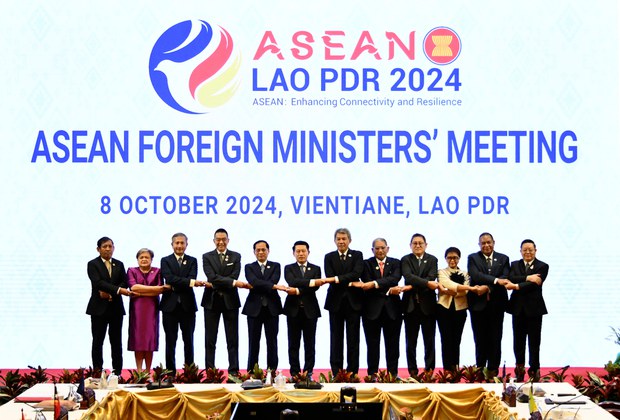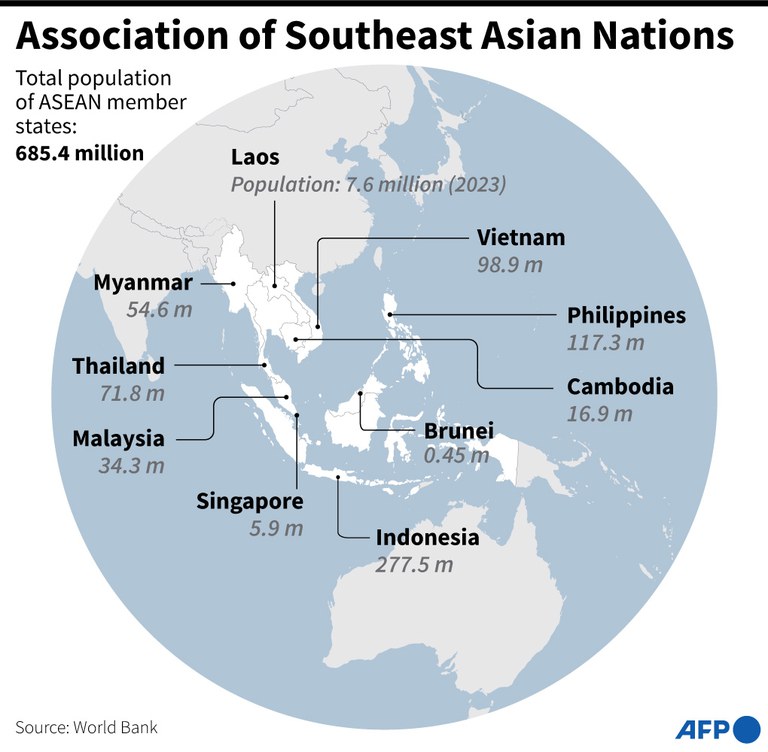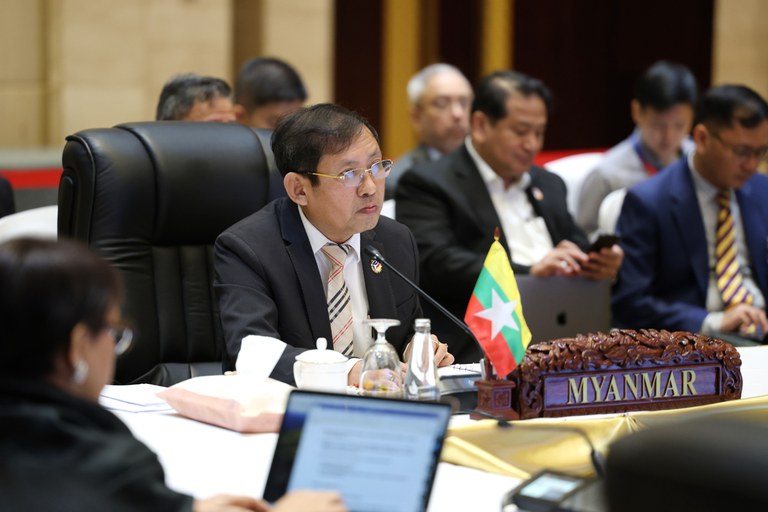ASEAN faces tests in tackling South China Sea tensions, Myanmar war
2024.10.08
Vientiane, Laos, and Manila
 Association of Southeast Asian Nations leaders gather for a group photo at the foreign ministers meeting in Vientiane, Laos, Oct. 8, 2024.
Association of Southeast Asian Nations leaders gather for a group photo at the foreign ministers meeting in Vientiane, Laos, Oct. 8, 2024.
This week’s summit of ASEAN leaders in Laos, diplomats and analysts say, will serve as a test for the bloc’s ability to address two of its most pressing challenges: the escalating tensions in the South China Sea and the crisis in Myanmar.
The meeting comes as recent encounters in the South China Sea between an increasingly assertive China and two ASEAN members, the Philippines and Vietnam, raise fears of a serious clash. It also comes as Myanmar’s civil war, sparked by an early 2021 military coup, grinds on with more civilians being killed and displaced.
The 10-member Association of Southeast Asian Nations has tried to help resolve both problems but has little to show for its efforts.

To ensure its relevance, the regional bloc must be able to collectively act on the region’s most daunting challenges, said Saleumxay Kommasith, the Laos deputy prime minister and minister of foreign affairs.
“ASEAN’s concerted effort is needed to respond collectively and effectively to these challenges with a view to maintaining and promoting regional and global peace, stability and prosperity as well as maintaining ASEAN relevance and centrality as the primary driving force in evolving the architecture,” Saleumxay said during a Tuesday meeting of the group’s foreign ministers.
But diplomats and analysts said the need for “consensus-driven” decision-making in a bloc that includes countries with diverse political systems and foreign-policy objectives makes decisive collective action difficult.
“When it comes to more contentious issues, like the South China Sea dispute or the political crisis in Myanmar, ASEAN has shown significant weaknesses,” said Isha Gharti, a public policy professor at Thailand’s Chiang Mai University.
“ASEAN must adapt its approach if it is to achieve tangible results,” Isha said.
Mounting South China Sea tensions
China claims nearly the entire South China Sea, a waterway considered crucial to world trade. But four ASEAN member-states have overlapping claims in the potentially mineral- and gas-rich region – Brunei, Malaysia, the Philippines and Vietnam.
Over the years, ASEAN has been trying to negotiate a “code of conduct” with China in the South China Sea.
“Negotiations on the code of conduct continue at a snail’s pace,” former Thai Foreign Minister Kantathi Suphamongkhon told the Reuters news agency.
“Some parties to the negotiation are now hinting that the code of conduct should also not be legally binding,” he said adding, “this would be unfortunate.”
RELATED STORIES
ASEAN chief: Bloc won’t pick sides in US-China rivalry
China, ASEAN unlikely to achieve Code of Conduct in 2024: Experts
ASEAN Special Envoy meets with Myanmar junta leader
ASEAN calls for a ceasefire in Myanmar a boon for struggling junta
In the meantime, China is sending out ships in the South China Sea, including into the exclusive economic zones of ASEAN members such as the Philippines and Vietnam, and violent confrontations have been occurring more frequently.
Just hours before Philippine President Ferdinand Marcos Jr. left Manila to attend the summit on Tuesday, Philippine authorities accused China Coast Guard ships of using water cannons to block two Filipino supply boats delivering supplies to fishermen near Scarborough Shoal.
The shoal – known as Huangyan island in China and Panatag Shoal in the Philippines – is within Manila’s exclusive economic zone but has been under Beijing’s de facto control since 2012.
Despite the incident, the Philippine boats managed to deliver supplies near the shoal, according to Manila’s Bureau of Fisheries and Aquatic Resources.
In a statement, the China Coast Guard said the Philippine boats “invaded the waters” near the shoal, leading its ships to conduct what they called “control measures.”
Marcos said he would once again raise the issue of an “open and free” sea region at the summit, where he is expected to seek support from the bloc amid China’s activities in the disputed waterways.
“As we continue to grapple with sharpening regional tensions, including the recent dangerous incidents in the [South China Sea], I intend to champion our advocacies in promoting an open, inclusive, and rules-based international order and for the peaceful resolution of any disputes in accordance with international law,” Marcos said in Manila.
Myanmar crisis
Myanmar frequently has been at the heart of ASEAN deliberations since 1997, when the country was admitted to the group in the hope that “constructive engagement” would foster reform more effectively than Western sanctions.
But the 2021 coup was a huge shock for ASEAN after a decade of tentative reform and quasi-civilian rule under Aung San Suu Kyi raised hope that Myanmar was on a path to peace and prosperity, analysts said.
Shortly after the coup, ASEAN proposed a five-point peace plan, called a “consensus,” which included a ceasefire and talks, but Myanmar’s generals have ignored it. The military junta has battled against a loose alliance of ethnic minority forces and pro-democracy fighters who have been making significant battlefield gains.
In response, ASEAN has barred leaders of Myanmar’s junta from its summits, but Aung Kyaw Moe, permanent secretary of the foreign ministry, is representing his country at this week’s gathering in Laos.

Moving forward, the regional bloc is crucial in ending Myanmar’s protracted civil war, Thai Prime Minister Paetongtarn Shinawatra said on Monday.
“ASEAN must play a key role in bringing peace back to Myanmar as soon as possible,” she said. “We will focus on working with Malaysian Prime Minister Anwar Ibrahim, who will assume the ASEAN chair next year, and use diplomatic mechanisms to resolve this issue as soon as possible.”
The summit in Laos will be followed by meetings with top leaders and diplomats from other countries including China, the United States, Japan and Russia.
READ MORE
US presidential elections: Implications for Manila-Washington alliance, South China Sea
Philippine defense chief calls China ‘biggest disruptor’ to regional peace
Philippines slams alleged Chinese attack on Vietnamese fishermen







